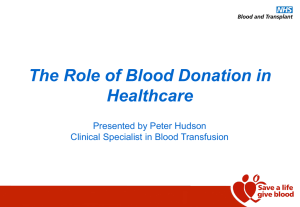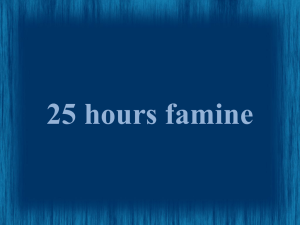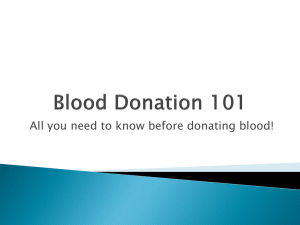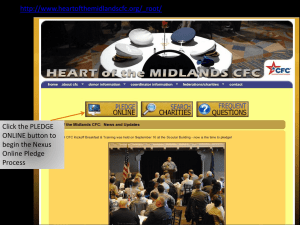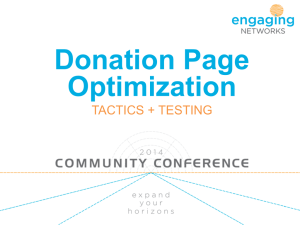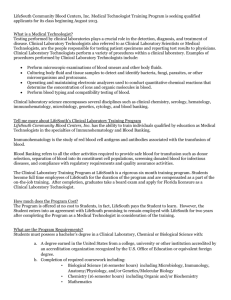General Blood Donation Presentation
advertisement
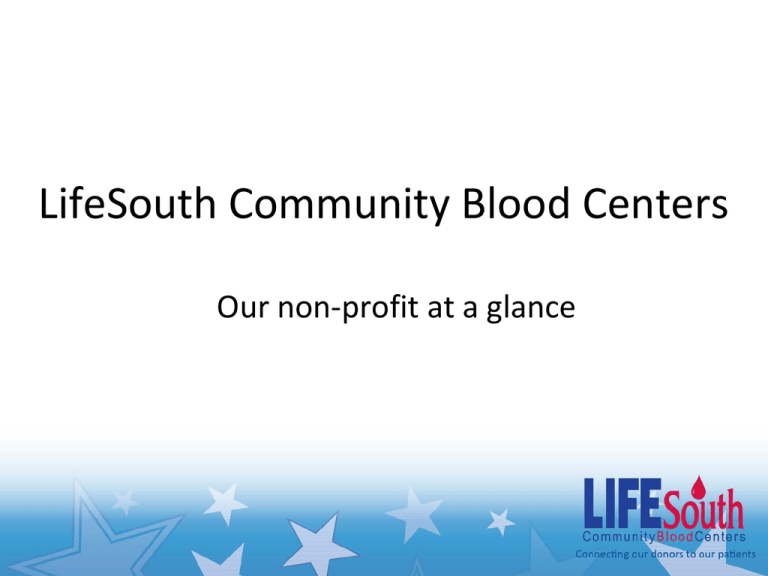
LifeSouth Community Blood Centers Our non-profit at a glance Mission Statement To provide a safe blood supply that meets or exceeds the needs in each community we serve, and to provide a variety of services in support of ongoing and emerging blood and transfusion related activities. Nancy Eckert, CEO/President • As President and CEO, Nancy is appointed by the LifeSouth Board of Directors and is a non-voting, exofficio member of the board and all committees • As President and CEO, Nancy is responsible for implementing policies and directives promulgated by the board. In this capacity, Nancy assumes full authority and accountability for the efficiency and ongoing success of the organization History • Founded in 1974 to serve three local Gainesville community hospitals • Local civic club members – Civitan Club personally signed the note for $50,000 loan to open the blood center • Growth of the community blood bank through partnerships with hospitals LifeSouth Today • Collect, test and distribute more than 800 units of blood each day – approximately 275,000 annually • Provide approximately 330,000 units to hospitals each year to meet patient needs • Serve over 100 medical facilities in the Southeastern US • 30 collections sites • 38 bloodmobiles & 70 transport vehicles Daily Operations • 363 days a year collect blood through community blood drives – Rely heavily on community and business partners to meet the needs of our local hospitals • 363 days a year test and process into needed blood components • 365 days a year – 24/7 deliver blood to community hospitals Florida • Gainesville - District Hub – – – – Chiefland - 1997 Lake City - 1980 Palatka - 1993 Alachua - May 2009 • Brooksville - District Hub - 1987 – – – – Ocala - 1987 Lecanto - 1983 Inverness - 1993 Dunnellon - 2007 Georgia • Atlanta – District Hub - 1995 – Gainesville - 1997 – McDonough - 2008 Alabama • Huntsville – District Hub - 2002 – Sheffield - 2008 – Albertville - 2004 – Decatur - 2004 • Birmingham – District Hub - 1994 – Alabaster – 2007 Alabama • Montgomery – District Hub - 1998 – Dothan - 2003 – Opelika - 1995 • Mobile – District Hub 2007 – Daphne - 2008 Blood Center Funding • LifeSouth charges hospitals a service fee for each unit of blood • The processing fee covers the cost of recruiting, collecting, testing, storing and transporting blood components • There’s no charge associated with what’s actually “in the bag” • Processing fees cover the costs associated with providing a safe and adequate blood supply Why is Blood Donation So Important? • Every 3 seconds someone needs a blood transfusion • Blood must be donated, tested and provided to the hospital before it is needed • 32,000 pints of blood are needed each day • Each donation can help save 3 or more lives • Patients only receive a transfusion if their life depends on it Types of Blood Donations • Whole blood – Can be donated every 8 weeks – Is separated into components at LifeSouth – Helps 2-4 different patients • Apheresis – Collection of specific blood components – Can donate platelets every 14 days Types of Donations • Double Red Cells – Collection of red cells only – Can donate every 16 weeks Whole Blood Donation • The most common way to donate • Actual donation time of 5-15 minutes • Allow 45 to 60 minutes for registration, health interview, donation and refreshments • Blood is usually separated into red cells, platelets and plasma to help multiple patients Apheresis Donation • Automated collection process that can separate components as they are donated • Can provide a full patient dose of platelets for transfusion • Can also provide plasma and/or red cells • Allow 2 hours for donation process Double Red Cell Donation • Automated collection process • Provides two full patient doses of red cells for transfusion • Donation time is approximately 30 minutes Levels of Community Blood Needs • Urgent- We have less than 1 day supply of blood on our shelves and our hospitals have less than 5 days of supply • Critical- We have less than 1 day supply of blood and our hospitals have less than 2 days of supply • Emergency-We have less than 1 day supply of blood and our hospitals have less than 1 day supply and elective surgeries are being cancelled or rescheduling Who Can Donate? • Donors must be 17 or older, (16-year-olds may donate with written parental permission) • Donors must weigh 110 pounds or more • Donors must show I.D. • Donors must be in general good health • Each potential donor has a “mini-physical” to check vital signs, iron level and health history • All donors receive a recognition item and a cholesterol screening Who Needs Blood? • Trauma patients • Cancer patients • Transplant recipients • Surgical patients • People with blood diseases and disorders such as Sickle Cell Disease What is Sickle Cell Disease? Genetic abnormality of hemoglobin production – Hemoglobin in red blood cells carries oxygen – Normal hemoglobin is called hemoglobin A (for adult) – Sickle hemoglobin is called hemoglobin S Complications of Sickle Cell Disease • Shortened red blood cell life Jaundice, gallstones • Clumping of sickled cells – Acute pain syndrome – Stroke – Acute chest syndrome – Splenic sequestration (painful) “Autosplenectomy” – Hand-foot syndrome – Delayed growth – Liver disease • Leg ulcers • Pregnancy complications – Intrauterine growth – Retardation – Spontaneous abortion – Pre-eclampsia • Pulmonary hypertension • Acute and chronic renal failure • Blindness • Chronic pain • Life expectancy is 40 to 50 years of age Treatment of Sickle Cell Disease • Reducing pain – OTC meds and heating pads for mild-moderate pain – Hospitalization with narcotics and fluid administration for severe pain • Preventing complications – Daily doses of penicillin – Hydroxyurea • Long-term treatments: – Blood transfusions (most common) – Bone marrow or cord blood transplants if a match is found Blood Types Needed for Sickle Cell Patients • O Positive/Negative Donors with Special Antigens •Ethnically Diverse • Blood that has been drawn within the last 7 Days preferred • Only 6% of the population has this type of blood Donors with this type of blood are considered Sickle Cell Heroes LifeSouth’s Efforts to Support Sickle Cell Patients • Identify/recruit blood donors as Sickle Cell Heroes to match up with specific patients • Make available cord blood units or bone marrow donors for transplantation FUTURE HOPE: • Perform molecular typing of all patients and have enough donors to provide identically ‘matched’ blood to patients who can’t be transplanted Cord Blood & Bone Marrow • Cord Blood and bone marrow have been used to CURE Sickle Cell in children • Research is ongoing for transplants for adults • The cord blood or bone marrow from a donor is implanted in a patient and new, healthy blood grows in the patient, replacing their diseased blood What is LifeCord? • • • • • Accredited Public Cord Blood bank established in 1997 Founded to make transplants possible for everyone in need Adheres to the highest standards of quality and safety Ensures the safety of each donation for both mom and baby Protects the confidentiality of personal and family medical history Five Points of Life Creating a Donation Generation Objective To educate the public on the ways to share life with others through donation with a focus on school age children and young adults to create a Donation Generation. Our Vision • Imagine a world where every eligible donor gives blood, joins the marrow registry, talks to their family about organ donation and learns more about cord blood donation • Imagine every school age child is educated on the importance of donation so when they are eligible to donate, they will donate and become the “Donation Generation” • Five Points of Life aims to change the world. Imagine never having a blood shortage or waiting on a list for a lifesaving donation Initiatives •Kids Marathons •Five Points of Life in the Classroom •Fundraising for Marrow Kids Marathons How This Helps LifeSouth • • • • Good opportunity to work with schools Media Great community event Blood drives will follow Field trip to LifeSouth’s Civitan Region in Gainesville, Fla. FPOL in the Classroom • Education curriculum and materials cover the five points of life with a strong focus on blood • Field trip option • Not only about science, but also social responsibility • Goal to reach 55,000 kids by December 2012 Benefits Advisory Council Mission The mission of the council is to grow LifeSouth Community Blood Center’s blood collections in the local community. What do we expect from you? • Give local management input from the community, provide advice in a field of expertise and commit to helping LifeSouth increase blood donations in said community • Recruit blood donors to support its local community’s needs through the establishment of blood drives, obtaining appropriate media coverage, networking with other community leadership and businesses, assisting with the promotion and awareness of the Five Points of Life programs and through communication with the local medical community • Actively participate in Council meetings and events that support LifeSouth and Five Points of Life Remember the Reason Connecting our donors to our patients
